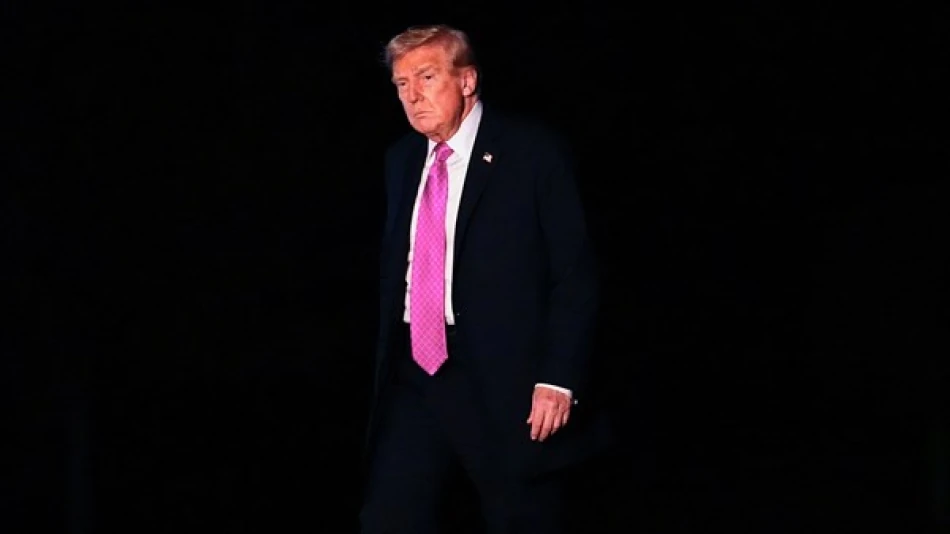
Britain Braces for Trump's Impending Visit: A Diplomatic Showdown in the Making
Trump's Second UK State Visit Signals Strategic Tech Partnership as Britain Courts Post-Brexit Allies
Donald Trump will make history this week as the first U.S. president to conduct a second state visit to the United Kingdom, arriving Wednesday for a carefully orchestrated diplomatic mission that underscores Britain's urgent need to strengthen international partnerships in the post-Brexit era. The visit will culminate in what British officials are calling a "world-leading technology partnership," signaling London's strategy to position itself as America's preferred tech ally in an increasingly fragmented global landscape.
Royal Treatment Reflects Political Priorities
The elaborate reception planned for Trump and First Lady Melania reveals the weight Britain places on the U.S. relationship. Prince William and Princess Catherine will greet the couple at Windsor Castle, located 40 kilometers south of London, before King Charles III and Queen Camilla host a full state ceremony complete with military flyovers and a formal state banquet.
This level of pageantry—reserved for Britain's most strategically important relationships—demonstrates how Brexit has reshuffled diplomatic priorities. Where the UK once leveraged EU membership for global influence, it now relies heavily on bilateral partnerships with major powers like the United States.
Symbolic Continuity Amid Change
Trump's planned visit to Queen Elizabeth II's grave carries particular significance. Having met the late monarch during his 2019 visit to Buckingham Palace, Trump represents a bridge between the Elizabethan era and King Charles's reign—a continuity that Britain hopes extends to transatlantic relations regardless of changing political leadership.
Technology Partnership Takes Center Stage
Thursday's business-focused agenda represents the visit's true strategic value. Trump will travel to Prime Minister Keir Starmer's countryside residence alongside a delegation of American business leaders to formalize what British officials describe as a "world-leading technology partnership."
This timing is no coincidence. As the U.S. and China engage in an escalating tech war, Britain sees an opportunity to position itself as America's primary European partner in critical technologies like artificial intelligence, quantum computing, and advanced semiconductors. Similar strategies have proven successful for countries like South Korea and Japan, which have leveraged tech partnerships to strengthen their strategic relationships with Washington.
Post-Brexit Economic Imperative
For Britain, deepening tech ties with the U.S. serves multiple purposes. It provides access to American innovation ecosystems, offers alternative supply chains to reduce dependence on China, and creates high-value economic opportunities that can help justify Brexit's economic costs. The partnership also aligns with Britain's ambitions to become a global hub for emerging technologies—a goal that requires close cooperation with Silicon Valley and American tech giants.
Strategic Implications for Global Tech Competition
This partnership announcement comes as Western nations increasingly view technology as a national security priority rather than merely an economic sector. Britain's willingness to roll out the royal red carpet for Trump suggests London believes aligning with Washington's tech priorities is essential for maintaining relevance in an era of great power competition.
The move mirrors successful strategies employed by other U.S. allies. The UAE has leveraged its relationship with American tech companies to become a regional innovation hub, while Singapore has used similar partnerships to maintain its status as Southeast Asia's financial and technological center.
For investors and technology companies, this partnership signals Britain's commitment to creating a regulatory environment that favors U.S.-UK collaboration over alternatives involving China or other competitors. This could accelerate investment flows and joint ventures between American and British tech firms, particularly in sectors where both governments see strategic value.
The state visit's elaborate choreography ultimately serves a simple purpose: demonstrating that despite political changes in both countries, the fundamental strategic partnership between Britain and America remains Britain's most important international relationship in the post-Brexit world.
Most Viewed News

 Layla Al Mansoori
Layla Al Mansoori






